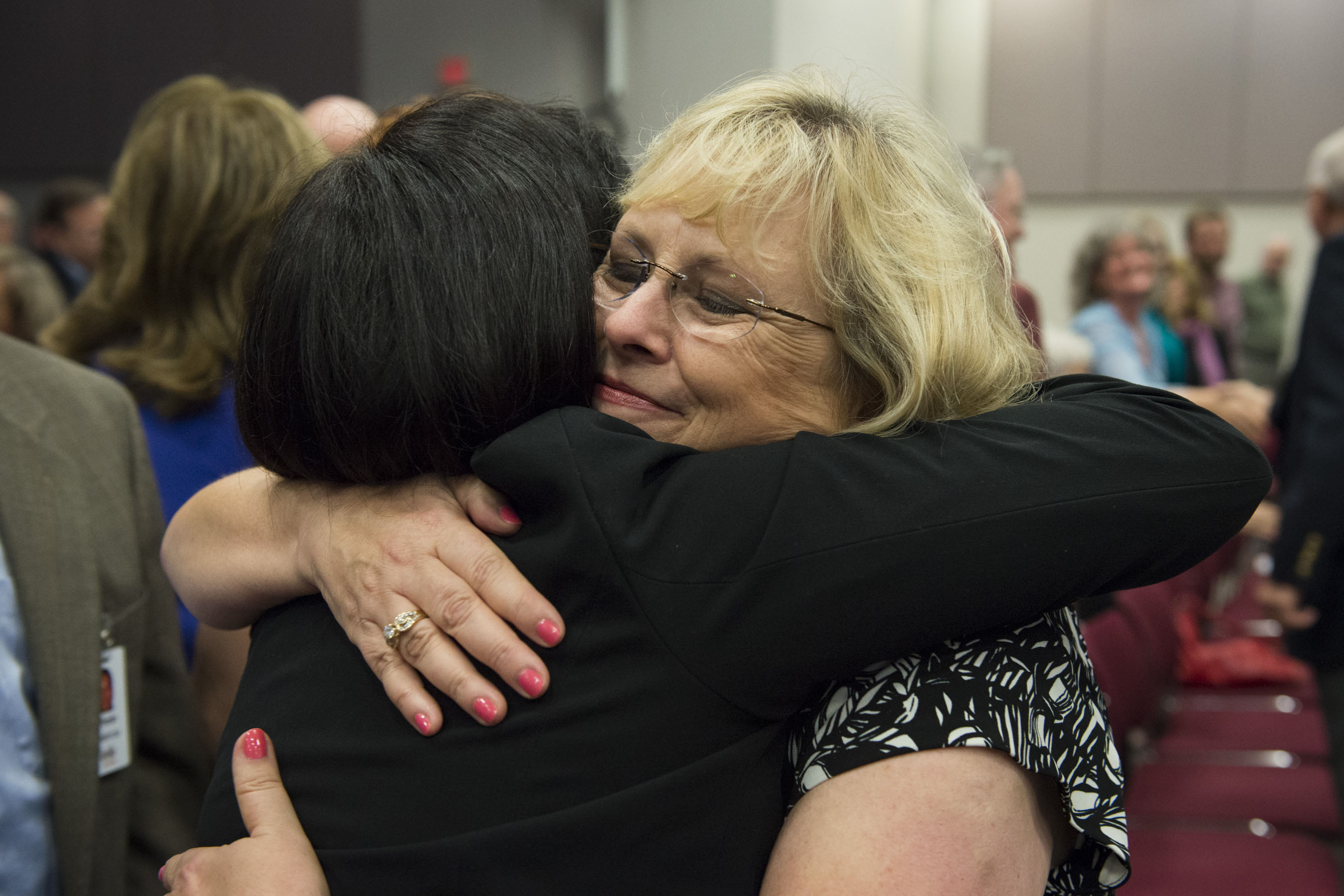
RICHMOND, Va. (BP) — Mary Doyle gasped when she saw the photo showing the dismembered body of a little boy, no more than 5 years old. He was the son of a church leader who had gone missing during a pastors’ retreat in Jalingo, Nigeria, where Mary and her husband, Alvin, served as Southern Baptist missionaries. They’d prayed, even sent out search parties, but with no luck. Authorities later determined the boy was kidnapped by a local witchdoctor and used as a human sacrifice. For the Doyles, who call Mississippi home, it was a horrifying reminder of the spiritual darkness they’d come to fight.
“What I saw that day will forever abide in my memory,” Mary shared during IMB’s emeritus recognition service, May 3, near Richmond, Va. The couple’s story struck a poignant chord during a time of celebration as the International Mission Board honored 33 recently retired missionaries, including the Doyles. Dozens of family members, friends and colleagues gathered to listen to memories and lessons learned from the missionaries, many who had spent more than three decades on the field. Combined, their years of service total 863.
“I want to get on the ground and kiss their feet because I am in the presence of people of whom the world is not worthy,” IMB President Tom Elliff said of the emeritus missionaries. “Think of all the other things they could have been doing. Nothing measures up to being a part of the greatest enterprise in the universe. … If anything, they wish they had another life, another 100 lives — another 1,000! — to give doing the very thing they have done.
Speaking from 2 Timothy 1:12, Elliff said the Bible teaches Christians that the spread of the Gospel often comes through suffering. It’s a truth the Doyles know from experience. During their six years in Nigeria working with the Mumuye people, the couple was constantly confronted with the ugly realities of tribal warfare — burnt-out villages, young lives wasted.
But the suffering was personal, too. The Doyles remember a particularly dark time after moving to the town of Jalingo. It was the beginning of May, and temperatures already topped 110. The Doyles’ house had no electricity or running water. Mary broke out in full-body rash, and Alvin contracted malaria. June 3 was the anniversary of their eldest son David’s death. To make matters worse, their youngest Dwayne graduated from college that month. But the Doyles weren’t there to see it.
“We knew were going to be gone for Dwayne’s graduation,” Mary said, knowing new missionaries weren’t allowed to return to the U.S. for the first three years. “But when that time comes, there’s this emptiness in your heart. You stop and you think, ‘Lord, are we supposed to be here?’ … You wonder, is it worth all of this?”
Now, looking back over their 20-year career, Alvin and Mary say they have no doubt about their choice.
“They worked hard, they played hard, they liked to drink and fight,” Alvin said of the Mumuye. But they were also open to the Gospel. “We baptized 350 a year in Nigeria — every year, for six years…. God blessed us in Africa.”
Overcoming obstacles
While some emeritus missionaries dealt with challenges from animism, Islam or other religions, others sparred with the government. One spoke of sharing Jesus in an East Asian country where it was illegal to own a Bible, host a prayer meeting or even talk with Christians. Another who served in Central Asia remembered God working a small miracle, arranging a two-hour window to share Jesus with a waitress in an unusually empty restaurant soon after the government passed new laws making it illegal to evangelize. For Paula O’Reilly,* things got unusually dicey during a stint in Europe when a government agent “requested” an interview at O’Reilly’s home to discuss her visa.
“We think you are missionaries,” the agent bluntly accused O’Reilly, a South Carolina native. But she was prepared. O’Reilly had already caught the agent off-guard by surprising him with a “Sunday Southern dinner like you wouldn’t believe. He walked in the door and the cornbread was coming out of the oven — he was stunned,” she said.
During the interview, O’Reilly chose her words carefully.
“If answering a student’s question in a classroom is being a missionary, then I am guilty as charged,” she said. “The student asked me if I believed in God. I responded to him, ‘Yes, I believe in God. I believe in His Son, Jesus Christ. I believe He died on the cross to save me from my sins, and because of that I now have eternal life.'”
The agent shrugged off her answer.
“You were answering a question, and we have religious freedom,” he said.
A few weeks later, O’Reilly’s visa was renewed for another year.
Seeing lives changed
Many of the emeritus missionaries reminisced about seeing changed lives through new relationships with Christ. Wayne and Debbie Brinkley shared about discovering God already at work in remote South American villages in Bolivia and Peru. Believers there had prayed for years that God would send someone to teach them His Word. Working alongside local believers, Michael and Lindy Howard helped start more than 200 new churches in 11 years in Zambia. During their 29-year career in Uruguay, Ron and Carla Roy watched the country move from receiving missionaries to sending missionaries of its own. But sometimes, big numbers don’t leave the biggest impact.
For missionaries Rick and Cooky Kuter, a young prostitute’s journey to faith is something they’ll never forget from their 25-year service in Southeast Asia.
“A young lady came to the city intending to join thousands of others who sell their bodies,” Cooky said. “As she exited her hotel, she saw a sign on a taxi that read, ‘Tired? Lonely? Stressed? Jesus is the answer.’ She asked the driver to take her to the church written on the sign. There she gave her life to Christ.”
Southern Baptists thanked
Emeritus missionaries also took time to say “thank you” to Southern Baptists for their faithful support of international missions.
“If we could tell Southern Baptists anything, it would be this: Thank you for all you’ve done in sending us to the ends of the earth and for giving us the opportunity to be a part [of God’s work],” said missionaries Steve and Michelle Riddle, who served for 26 years in Brazil.
Many of the missionaries also challenged Southern Baptists that there’s still plenty of work left to be done. Sam and Delores York spent 15 years in Haiti. They recalled two small, isolated villages where local Christians refused to go because of the presence of evil spirits. The Yorks decided to visit anyway.
“It was a rugged path over boulders where even a horse could not go, so we set out on foot,” Sam said. “It was an exhausting, hot and difficult trek.”
When they arrived, the Yorks struck up a conversation with local men who were amazed the Yorks weren’t afraid to be there. The Yorks asked for permission to return to tell Bible stories and start a church, and to their surprise, the men said they would be welcome. But it was not to be. Before they could return, the Yorks were reassigned to the Dominican Republic to work with Haitians there. They still wonder about those villages.
“At this point, no Christian goes into those two small villages,” Sam said. “How many others don’t have a witness?”
–30–
*Name changed. Don Graham is an IMB senior writer. Get Baptist Press headlines and breaking news on Twitter (@BaptistPress), Facebook (Facebook.com/BaptistPress) and in your email (baptistpress.com/SubscribeBP.asp).















